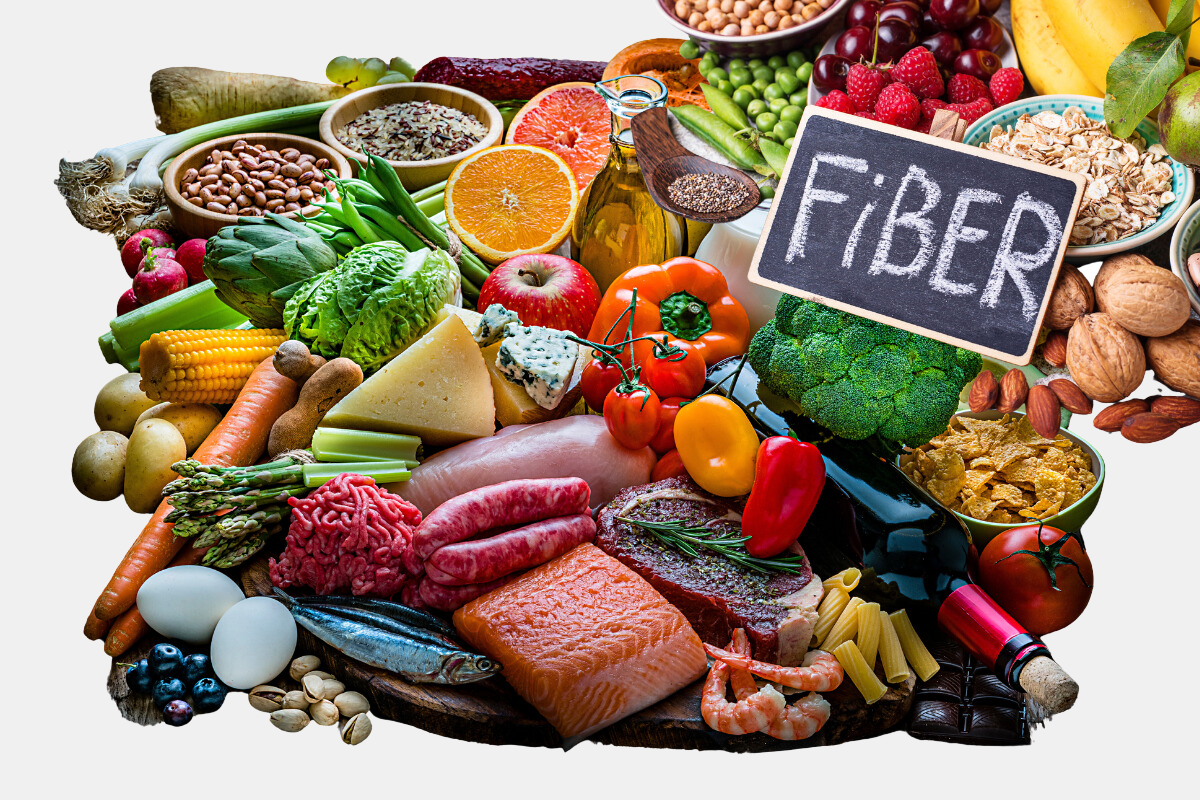When it comes to managing constipation, high fiber diet for constipation is a powerful ally. It plays an important role in promoting healthy digestion, preventing constipation and maintaining regular bowel movements. In this article, we will cover best fiber diet for constipation plan for your constipation but before that we’ll explore the importance of fiber in relieving constipation, discuss the different types of fiber and their benefits, and provide recommendations for daily fiber intake to effectively prevent constipation.
Table of Contents
Importance of fiber diet for constipation
A fiber diet plan is really important for preventing constipation and keeping your digestive system healthy. Fiber offers numerous benefits to your body. It helps you have regular bowel movements and keeps your gut in great shape. Fiber works by making your poop bigger and helping it move through your intestines smoothly. It also soaks up water, which makes your poop softer and easier to go. When you eat enough fiber, it stops waste and harmful substances from building up in your colon. This lowers the chances of getting constipated and keeps your whole digestive system working well.
How fiber helps in digestion:
Adds bulk to stool: Fiber adds volume to the stool, making it larger and softer. This bulkiness helps stimulate the muscles in the intestines, promoting regular bowel movements and preventing constipation.
Softens the stool: Fiber absorbs water as it passes through the digestive system, which helps to soften the stool. This makes it easier to pass through the intestines and reduces the likelihood of experiencing hard, dry stools.
Promotes regular bowel movements: By adding bulk and softening the stool, fiber aids in maintaining regular bowel movements. It helps prevent both constipation and diarrhea by regulating the transit time of food through the digestive tract.
Supports a healthy gut microbiome: Certain types of fiber, known as prebiotics, serve as food for beneficial bacteria in the gut. These bacteria are essential for digestion and maintaining a healthy gut. By providing nourishment to these helpful microbes, fiber promotes a healthy balance of gut bacteria.
Reduces the risk of colon-related issues: A high-fiber diet has been linked to a lower risk of various colon-related problems, including hemorrhoids, diverticulitis, and colon cancer. Fiber aids in the regular elimination of waste, minimizing the time that harmful substances come into contact with the colon lining.
Helps control blood sugar levels: Soluble fiber, found in foods like oats and legumes, can help regulate blood sugar levels. It slows down the absorption of sugar into the bloodstream, preventing rapid spikes and promoting stable blood sugar control.
Supports weight management: High-fiber foods tend to be more filling, leading to a reduced appetite and improved weight management. Fiber adds bulk to meals, creating a sense of fullness and satisfaction, which can help prevent overeating.
Different Types of Fiber and Their Benefits:
There are many types of fibers. Each type of fiber functions uniquely in your body and offers distinct health benefits. You might be acquainted with the terms “soluble fiber” and “insoluble fiber.”
Soluble Fiber:

Soluble fiber is a crucial component of a fiber diet for constipation, as it offers specific benefits in promoting regular bowel movements and relieving constipation. This type of fiber dissolves in water and forms a gel-like substance in the digestive system, aiding in the softening of stool and facilitating its passage through the intestines. Some examples of foods that are rich in soluble fiber include oats, barley, legumes (such as beans and lentils), fruits like apples and oranges, and vegetables like carrots and Brussels sprouts.
Consuming these soluble fiber sources helps add bulk to the stool, making it easier to pass. Additionally, soluble fiber acts as a prebiotic, promoting the growth of beneficial bacteria in the gut, which supports healthy digestion. Incorporating soluble fiber into your fiber diet for constipation management can contribute to improved bowel regularity and overall digestive wellness.
Benefits: Soluble fiber adds bulk to stool, softens it, and helps maintain regular bowel movements. Additionally, it can help control blood sugar levels and reduce cholesterol levels.
Insoluble Fiber:
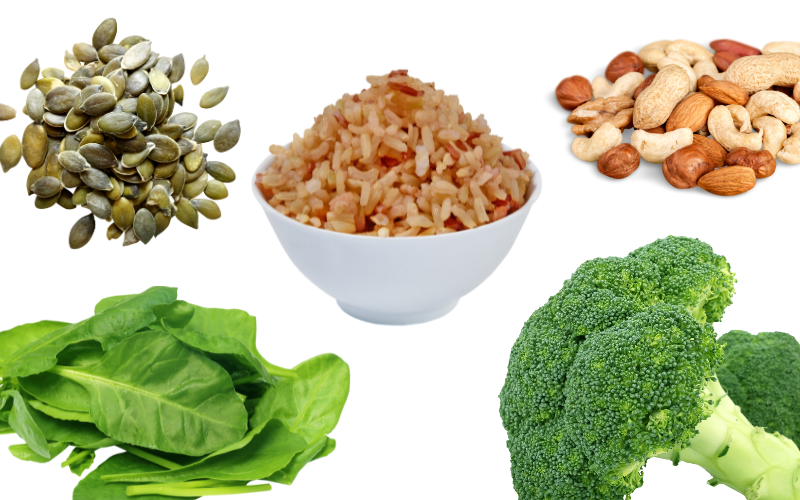
Insoluble fiber is an important part of a fiber diet for constipation. It has its own benefits in helping with regular bowel movements and relieving constipation. Unlike soluble fiber, insoluble fiber does not break down or dissolve in water. Instead, it adds bulk to your poop, which helps it move through your digestive system more easily. Insoluble fiber acts like a natural laxative, preventing constipation by making it easier for you to have regular poops.
Foods that are high in insoluble fiber include whole grains like brown rice and whole wheat products, vegetables like broccoli and spinach, and nuts and seeds. By eating these foods, you can add more insoluble fiber to your diet and support healthy digestion. Insoluble fiber adds bulk to your poop, which helps you get rid of waste from your body and lowers the chances of constipation. Including insoluble fiber in your fiber diet for constipation management can help improve your bowel function and keep your digestion healthy.
Benefits: Insoluble fiber promotes regular bowel movements, prevents constipation, and contributes to overall gut health. It may also help prevent diverticular disease, which involves a build-up of small pouches in the colon.
Recommended Daily Fiber Intake for Constipation Prevention:
Consuming adequate amounts of fiber daily is important to prevent constipation and support healthy digestion. As per the United State Dietary Guidelines for Americans (2020–2025), the majority of women (over 90%) and men (over 97%) fail to meet the recommended dietary fiber intake Here are some general guidelines:
- For adults, the recommended daily fiber intake ranges from 25 to 38 grams.
- Aim for a balanced intake of both soluble and insoluble fiber to maximize the benefits for constipation relief.
- Gradual increase: If your current fiber intake is low, gradually increase it to avoid digestive discomfort. Add a few grams of fiber to your diet each week until reaching the recommended daily goal.
- Distribute fiber throughout the day: Include fiber-rich foods with each meal and snack to ensure a consistent intake throughout the day.
Remember that drinking plenty of water and staying hydrated is essential when adding fiber to your constipation diet. Water helps the fiber to work effectively in softening the stool and preventing digestive problems.
Best Fiber Diet for Constipation
As we learned in the paragraph above about how important fiber is to our healthy digestive system, we will now provide an overview of fiber-rich foods, present a sample meal plan that includes high-fiber options, and share additional tips that will help you make the most. Fiber intake.
Overview of Foods Rich in Fiber:
Fruits:
Fiber-rich fruits are an excellent addition to a fiber diet for constipation. These fruits provide a delicious and natural way to increase your fiber intake and promote regular bowel movements. Fruits such as apples, pears, berries, and oranges are particularly rich in fiber. Apples, for example, contain a type of fiber called pectin, which helps add bulk to the stool and aids in its smooth passage through the digestive system. Pears are also high in fiber and can help soften the stool, making it easier to pass.
Berries, including raspberries, blackberries, and strawberries, provide a good amount of fiber along with antioxidants that support overall digestive health. Oranges are not only a refreshing source of vitamin C but also contain dietary fiber that promotes healthy digestion. Including these high fiber-rich fruits in your daily diet can help alleviate constipation and contribute to a well-balanced fiber diet for constipation management. Here are some high fiber foods for constipation.
- Apples, pears, berries, oranges, and bananas are excellent sources of fiber.
- Include whole fruits in your diet instead of juice to benefit from their fiber content.
Vegetables:
Incorporating fiber-rich vegetables into a fiber diet for constipation can significantly improve digestive health and alleviate symptoms of constipation. Vegetables such as broccoli, spinach, carrots, and Brussels sprouts are excellent sources of dietary fiber. Broccoli contains both soluble and insoluble fiber, providing bulk to the stool and supporting regular bowel movements. Spinach, on the other hand, is rich in insoluble fiber, which adds bulk and promotes efficient digestion. Carrots are not only packed with vitamins but also offer a good amount of fiber, aiding in smooth bowel movements.
Brussels sprouts are another fiber powerhouse, offering both soluble and insoluble fiber for optimal gut health. By including these fiber-rich vegetables in your diet, you can effectively increase your fiber intake and support a healthy digestive system. Remember to consume them in a variety of ways, such as steaming, roasting, or incorporating them into salads and stir-fries, to enjoy their maximum fiber benefits in your fiber diet for constipation management.
- Broccoli, carrots, Brussels sprouts, spinach, and kale are high-fiber vegetables.
- Aim for a variety of colors and include both raw and cooked vegetables in your meals.
Whole Grains:
Whole grains are a valuable component of a fiber diet for constipation. These grains provide a rich source of dietary fiber, helping to promote regular bowel movements and alleviate constipation. Whole grains such as oats, brown rice, quinoa, and whole wheat products are excellent choices. Oats are particularly high in soluble fiber, which forms a gel-like substance in the digestive tract, aiding in the smooth passage of stool. Brown rice and quinoa offer a combination of soluble and insoluble fiber, adding bulk and facilitating healthy digestion.
Whole wheat products, including bread, pasta, and cereals, are also fiber-rich options that contribute to a well-balanced fiber diet for constipation management. By incorporating these fiber-rich whole grains into your meals, you can increase your fiber intake and support optimal digestive health. Remember to opt for whole grain varieties rather than refined grains to maximize their fiber content and enjoy their benefits for constipation relief.
- Opt for whole grains like quinoa, brown rice, oats, whole wheat bread, and whole wheat pasta.
- Check food labels and choose products with higher fiber content.
Legumes:
Legumes are a fantastic addition to a fiber diet for constipation. These nutrient-rich foods are packed with fiber and can help promote regular bowel movements. Legumes such as lentils, chickpeas, and kidney beans are excellent choices. Lentils, for instance, are a great source of soluble and insoluble fiber, providing both bulk and softness to the stool. Chickpeas, on the other hand, offer a good amount of fiber that aids in digestion and prevents constipation.
Kidney beans are rich in both soluble and insoluble fiber, supporting proper bowel function and maintaining a healthy digestive system. Incorporating legumes into your meals, whether in soups, stews, salads, or as a side dish, can significantly increase your fiber intake and contribute to a well-rounded fiber diet for constipation management. Remember to soak and cook them properly to ensure optimal digestion and to experience the full benefits of legumes in relieving constipation.
- Lentils, chickpeas, black beans, and kidney beans are packed with fiber and protein.
- Add legumes to salads, soups, or make delicious bean-based spreads like hummus.
Sample of High Fiber Diet Plan / Daily high Fiber Diet for Constipation:
A daily fiber diet for constipation is important to help you have regular bowel movements. It involves eating foods that are high in fiber. These foods consist of a variety of fruits, vegetables, whole grains, and legumes. Fiber adds bulk to your stool and makes it softer, which helps it move through your digestive system more easily. This prevents and relieves constipation.
To follow a fiber diet for constipation, eat fruits like apples, oranges, berries, and pears. Include vegetables such as broccoli, carrots, Brussels sprouts, and spinach in your meals. Choose whole grains like oats, brown rice, quinoa, and whole wheat products. You can also eat legumes like lentils, chickpeas, and kidney beans in soups, stews, or salads.
It’s important to increase your fiber intake gradually to give your body time to adjust. Drinking enough water is also necessary when you’re on a fiber diet for constipation. Water plays a vital role in softening your stool and aiding its smooth passage through your digestive system.
By following a high fiber diet for constipation, you can have regular bowel movements and improve your digestion. If you have any concerns or need personalized advice, it’s always a good idea to talk to a healthcare professional or nutritionist. Remember, consistency and balance are key to getting the best results.
Here’s a one-day sample meal plan to help you incorporate high-fiber foods into your diet:
Breakfast:
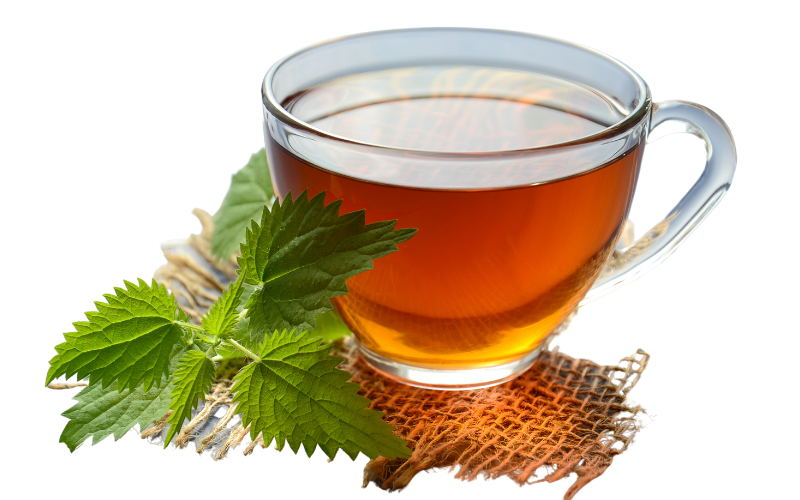
- Overnight oats topped with mixed berries, sliced almonds, and a drizzle of honey.
- A cup of herbal tea or freshly squeezed orange juice.
Snack:
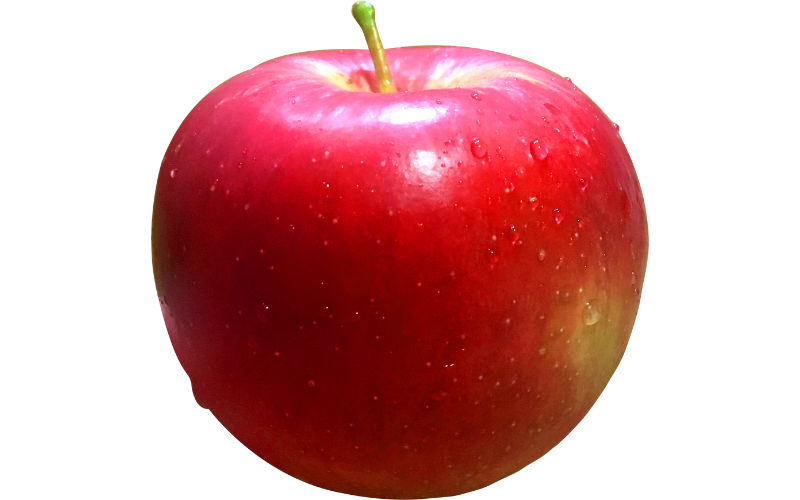
- A small portion of assorted nuts, including almonds, walnuts, and cashews.
- A medium-sized apple.
Lunch:

- A colorful salad with mixed greens, cherry tomatoes, cucumber, grated carrots, and chickpeas.
- Coated with a dressing made of olive oil and balsamic vinegar.
- Whole grain pita bread on the side.
Snack:
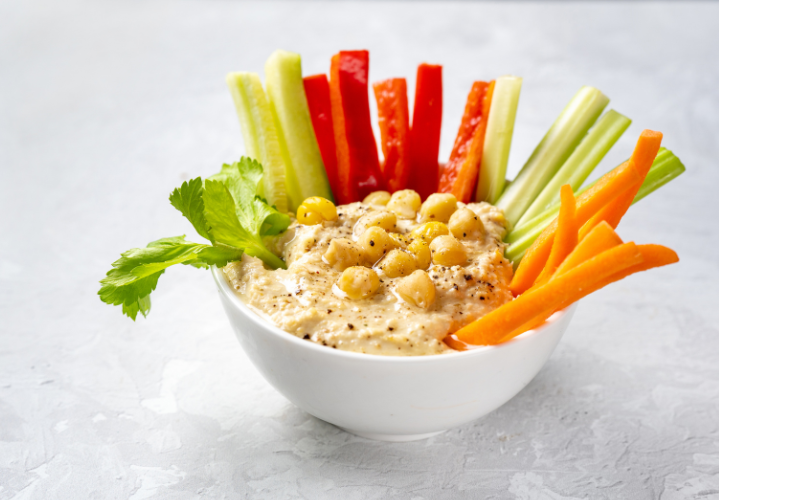
- Carrot sticks and hummus dip.
Dinner:
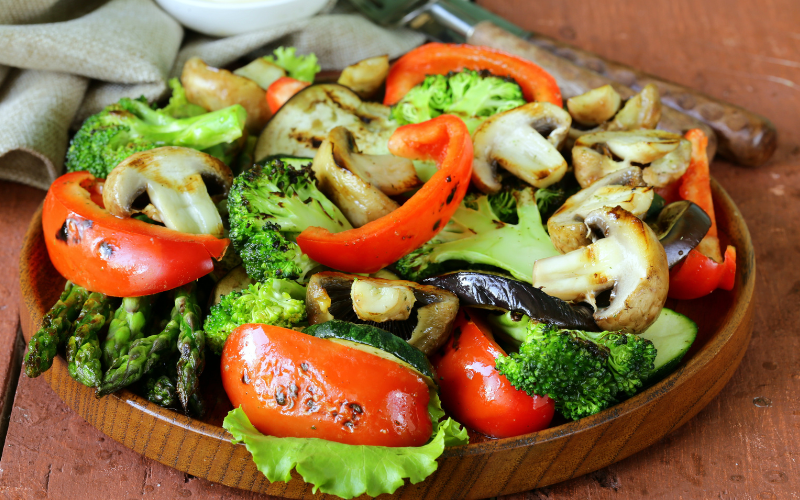
- Grilled chicken breast or baked salmon.
- Served with a side of roasted vegetables (broccoli, bell peppers, and zucchini).
- Quinoa or brown rice as a fiber-rich grain option.
Dessert:
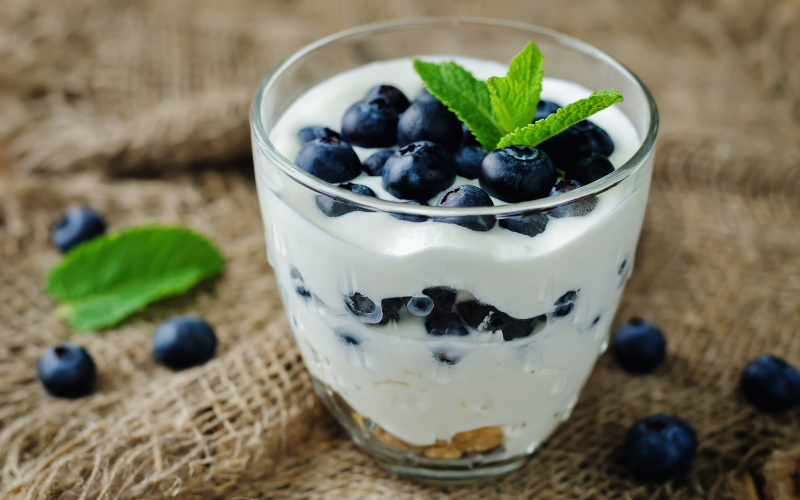
- A serving of assorted berries with a spoonful of Greek yogurt on top.
Additional Tips for Maximizing Fiber Intake:
Gradual Increase:
- To prevent digestive discomfort, it is recommended to gradually increase your fiber intake.
- Add a serving of high-fiber food to one meal or snack at a time.
Hydration:
- Ensure you drink an ample amount of water throughout the day to facilitate the smooth movement of fiber in your digestive system.
Variety:
- Include a wide range of high fiber-rich foods to benefit from different types of fiber and maximize nutritional intake.
Whole Foods:
- Choose whole, unprocessed foods over refined and processed options.
- Opt for whole fruits instead of juices, and whole grains instead of refined grains.
Meal Prepping:
- Plan and prepare meals in advance to ensure you have convenient access to high-fiber options.
Foods to avoid when constipated: If you’re constipated, it’s best to avoid certain foods. These include sugary and fatty processed foods like fast food and junk food. Try not to eat too much white bread or pasta made from refined grains. It’s also a good idea to stay away from drinks like soda, coffee, and alcohol, as they can make dehydration worse and worsen constipation.
Conclusion:
A high-fiber diet plan is an effective way to promote regular bowel movements and maintain a healthy digestive system. By incorporating fiber-rich foods like fruits, vegetables, whole grains, and legumes into your meals, you can support optimal digestion. Remember to gradually increase fiber intake, stay hydrated, and choose whole foods whenever possible. Enjoy the benefits of a high-fiber diet and say goodbye to constipation while nourishing your body with nutritious, fiber-packed meals.
In conclusion, a fiber diet for constipation is a natural and effective way to relieve symptoms and promote regular bowel movements. Including fiber-rich foods like fruits, vegetables, whole grains, and legumes in your diet helps support healthy digestion. The fiber adds bulk to the stool, softens it, and aids its smooth passage through the digestive system, alleviating constipation. Remember to gradually increase fiber intake, stay hydrated, and consult with healthcare professionals for personalized guidance. Embracing a fiber diet for constipation can contribute to improved digestive health and overall well-being.
FAQ: High Fiber Diet Plan for Constipation
1. What is the best high fiber diet plan for constipation?
A well-balanced high fiber diet plan for constipation includes fiber-rich foods like fruits, vegetables, whole grains, legumes, and nuts. Drinking plenty of water and maintaining a regular eating schedule also helps improve digestion.
2. How quickly does a high fiber diet relieve constipation?
A high fiber diet can start improving bowel movements within 24 to 72 hours, but consistency is key. Gradually increasing fiber intake and staying hydrated will maximize its effectiveness.
3. Can a high fiber diet plan for constipation cause bloating?
Yes, suddenly increasing fiber intake can lead to bloating and gas. To avoid discomfort, increase fiber intake gradually and drink enough water to help digestion.
4. What are the best fiber-rich foods to prevent constipation?
Top fiber-rich foods include oats, flaxseeds, apples, pears, lentils, chickpeas, whole wheat, and leafy greens. These promote healthy digestion and prevent constipation.
5. Is a high fiber diet safe for everyone?
While a high fiber diet is beneficial for most, individuals with digestive conditions like IBS should consult a doctor before making major dietary changes.
You can read more content like this here.

